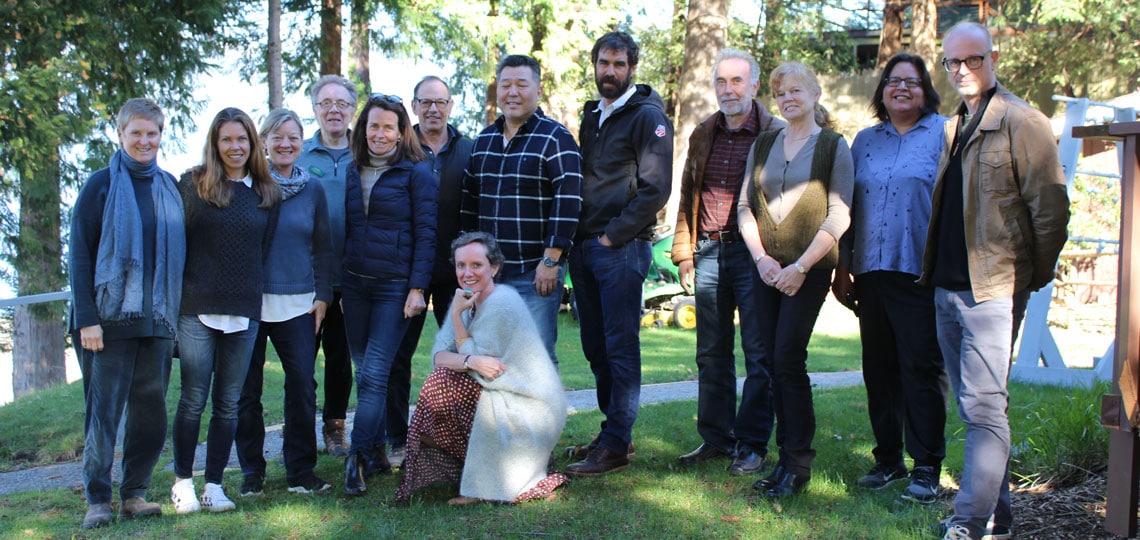A number of people from the Ecojustice community have reached out to me recently with questions about how the COVID-19 pandemic might affect Ecojustice’s strategy and finances. As we settle into this new reality, I thought it could be useful to share with all of you how the Ecojustice team is responding.
As you’ll see from the FAQ below, while Ecojustice is monitoring this rapidly-evolving situation and adjusting course where needed, in many ways it’s steady as we go.
One thing I’ve reflected on during the past few weeks is how tremendously grateful I am to Ecojustice’s powerful community of supporters. Thank you for all you do to support Ecojustice.
As a Canadian charity that does public interest law and relies on donor dollars to deliver on our mission, the need for your support is still there and will continue to be there on the other side of the pandemic. Thanks for sticking with us.
If the courts are closed, what happens to your cases?
It will depend on the case, what stage of litigation it is in, and which court is hearing the matter.
Cases that were slated for a scheduled hearing, such as the Supreme Court of Canada hearing on carbon pricing and Ecojustice’s legal challenge of Premier Jason Kenney’s public inquiry, have been adjourned (postponed) until distancing restrictions lift and courts reconvene. It is not yet clear when that might be, but preparation for those hearings continues in earnest.
Most other important litigation steps that happen behind the scenes, for example procedural motions and the exchange of documents between parties, continue to move along.
What is Ecojustice able to keep working on?
In addition to keeping our active litigation running, we continue to work on a number of fronts.
Regulatory processes have, to date, been mostly unaffected by the COVID pandemic (see: the recently released report on the Roberts Bank Terminal 2 project in British Columbia). Development of new litigation and legal theory continues, as have briefings with government on key law reform initiatives, including the modernization of the Canadian Environmental Protection Act and introduction of a federal climate accountability framework.
What is Ecojustice doing to keep governments honest about climate action and environmental protection during the COVID crisis?
The timelines in some of our work have changed, but our mission has not. So we’re going to keep doing what we’ve always done: Use the power of the law to defend nature, combat the climate emergency, and protect the health of Canadians.
A bright spot in what have been a challenging, uncertain few weeks is that we’ve seen governments step up and work together, unite behind the science, and rapidly mobilize resources to fight a public health emergency.
Ecojustice commends the action taken by governments across Canada to tackle the coronavirus pandemic head-on.
At the same time, we know other long-running efforts to protect the environment — efforts that have gained critical momentum in the last 12 months — must continue. We cannot stop now. This how we can ensure a safer, healthier future on the other side of the pandemic.
What does coronavirus mean for Ecojustice’s finances?
Environmental litigation takes time and often operates independent of what else might be happening the world. For this very reason, Ecojustice plans its operations on five-year cycles and maintains reserves upon which we can draw to keep our work going. This gives us high confidence in our ability to durably meet our mission — in good economic times and bad.
And, to achieve excellence in every aspect of our organization, Ecojustice works hard to recruit and retain the best people. Meeting our mission requires us to maintain a high caliber-workforce.
As soon as the scale of the coronavirus’ economic impact started to make itself known, Ecojustice took proactive measures to manage our finances prudently. Through a combination of adjusting our revenue forecasts, managing expenses, and drawing from our reserves, Ecojustice plans to maintain its staff and caseload going forward.
Of course, all this is contingent on the personal and financial health and wellbeing of the more than 16,000 Canadians who give to Ecojustice because they believe in what we do and why we do it. Being a recipient of donated funds is a privilege — now more than ever, and it is not a circumstance we have ever taken for granted.
Is Ecojustice thinking about how to encourage and pressure governments to develop environmentally-responsible government policy and laws for life after COVID-19?
Yes. Our internal conversations have focused two main topics. The first is how to ensure the safety and care of our workforce, and the second is what investments — of our time, energy, resources — we need to make now in order to set up Ecojustice’s mission for success in a post-COVID-19 world.
When this crisis is over, governments will no doubt be speaking of kick-starting the economy — and rightfully so. Ecojustice’s job is to be there, prepared to ensure that kick-start doesn’t come at the expense of the environment or through the dismantling of key environmental regulations we’ve worked so hard to put into place.
Practically speaking, this means adapting our existing strategies to account for coronavirus-related disruption in the near-term, and developing new ones that will position Ecojustice well in the longer-term to seize opportunities as they emerge and/or brace for an onslaught of environmental deregulation.
How can I help?
Self-isolating at home? Here are three simple things you can do right now to contribute to Ecojustice’s mission while we all navigate these uncertain times:
A number of people from the Ecojustice community have reached out to me recently with questions about how the COVID-19 pandemic might affect Ecojustice’s strategy and finances. As we settle into this new reality, I thought it could be useful to share with all of you how the Ecojustice team is responding.
As you’ll see from the FAQ below, while Ecojustice is monitoring this rapidly-evolving situation and adjusting course where needed, in many ways it’s steady as we go.
One thing I’ve reflected on during the past few weeks is how tremendously grateful I am to Ecojustice’s powerful community of supporters. Thank you for all you do to support Ecojustice.
As a Canadian charity that does public interest law and relies on donor dollars to deliver on our mission, the need for your support is still there and will continue to be there on the other side of the pandemic. Thanks for sticking with us.
If the courts are closed, what happens to your cases?
It will depend on the case, what stage of litigation it is in, and which court is hearing the matter.
Cases that were slated for a scheduled hearing, such as the Supreme Court of Canada hearing on carbon pricing and Ecojustice’s legal challenge of Premier Jason Kenney’s public inquiry, have been adjourned (postponed) until distancing restrictions lift and courts reconvene. It is not yet clear when that might be, but preparation for those hearings continues in earnest.
Most other important litigation steps that happen behind the scenes, for example procedural motions and the exchange of documents between parties, continue to move along.
What is Ecojustice able to keep working on?
In addition to keeping our active litigation running, we continue to work on a number of fronts.
Regulatory processes have, to date, been mostly unaffected by the COVID pandemic (see: the recently released report on the Roberts Bank Terminal 2 project in British Columbia). Development of new litigation and legal theory continues, as have briefings with government on key law reform initiatives, including the modernization of the Canadian Environmental Protection Act and introduction of a federal climate accountability framework.
What is Ecojustice doing to keep governments honest about climate action and environmental protection during the COVID crisis?
The timelines in some of our work have changed, but our mission has not. So we’re going to keep doing what we’ve always done: Use the power of the law to defend nature, combat the climate emergency, and protect the health of Canadians.
A bright spot in what have been a challenging, uncertain few weeks is that we’ve seen governments step up and work together, unite behind the science, and rapidly mobilize resources to fight a public health emergency.
Ecojustice commends the action taken by governments across Canada to tackle the coronavirus pandemic head-on.
At the same time, we know other long-running efforts to protect the environment – efforts that have gained critical momentum in the last 12 months – must continue. We cannot stop now. This how we can ensure a safer, healthier future on the other side of the pandemic.
What does coronavirus mean for Ecojustice’s finances?
Environmental litigation takes time and often operates independent of what else might be happening the world. For this very reason, Ecojustice plans its operations on five-year cycles and maintains reserves upon which we can draw to keep our work going. This gives us high confidence in our ability to durably meet our mission — in good economic times and bad.
And, to achieve excellence in every aspect of our organization, Ecojustice works hard to recruit and retain the best people. Meeting our mission requires us to maintain a high caliber-workforce.
As soon as the scale of the coronavirus’ economic impact started to make itself known, Ecojustice took proactive measures to manage our finances prudently. Through a combination of adjusting our revenue forecasts, managing expenses, and drawing from our reserves, Ecojustice plans to maintain its staff and caseload going forward.
Of course, all this is contingent on the personal and financial health and wellbeing of the more than 16,000 Canadians who give to Ecojustice because they believe in what we do and why we do it. Being a recipient of donated funds is a privilege ⸺ now more than ever, and it is not a circumstance we have ever taken for granted.
Is Ecojustice thinking about how to encourage and pressure governments to develop environmentally-responsible government policy and laws for life after COVID-19?
Yes. Our internal conversations have focused two main topics. The first is how to ensure the safety and care of our workforce, and the second is what investments — of our time, energy, resources — we need to make now in order to set up Ecojustice’s mission for success in a post-COVID-19 world.
When this crisis is over, governments will no doubt be speaking of kick-starting the economy — and rightfully so. Ecojustice’s job is to be there, prepared to ensure that kick-start doesn’t come at the expense of the environment or through the dismantling of key environmental regulations we’ve worked so hard to put into place.
Practically speaking, this means adapting our existing strategies to account for coronavirus-related disruption in the near-term, and developing new ones that will position Ecojustice well in the longer-term to seize opportunities as they emerge and/or brace for an onslaught of environmental deregulation.
How can I help?
Self-isolating at home? Here are three simple things you can do right now to contribute to Ecojustice’s mission while we all navigate these uncertain times:
- Not getting email updates from us? Sign up to get exclusive updates delivered straight to your inbox.
- Use your voice and take an advocacy action.
- We know these are challenging times for many, but if you are in a position to do so, please consider making a gift to support Ecojustice and help keep our work going.


